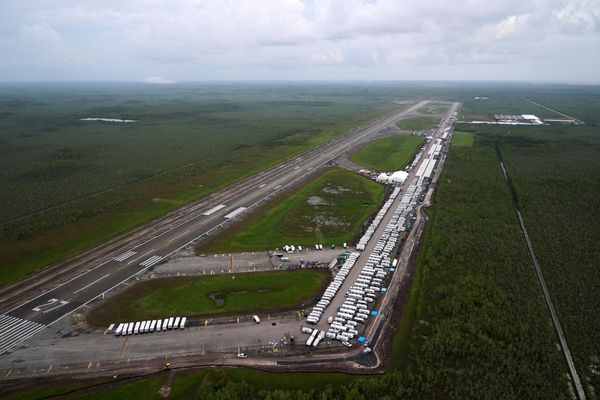
The FTSE-100 opened more than 100 points down today on a “Manic Monday” first day of trading since Donald Trump announced tariffs on Mexico, Canada and China.
In early trading the the City’s blue chip index dropped 112 points or around 1.3% to 8561.55 following heavy falls in Asian markets overnight. It comes after the index hit an all-time high last week.
The pound slumped almost a cent against the dollar at $1.228 while the price of Bitcoin dropped 2.4% to $95.315.
In Europe Germany ‘s DAX and France’s CAC 40 both opened around 2% down.
Earlier Japan’s Nikkei 225 Index plummeted more than 1000 points or just over 2.6% to 38,520 after Donald Trump confirmed he will be slapping 25% tariffs on imports into the US from Canada and Mexico and a 10% import tax on goods from China with effect from tomorrow. These three countries make up around 40% of imported US goods, worth around $1.35 trillion. All have threatened to respond with retaliatory tariffs of their own.
The US President has also Trump has also threatened possible tariffs against the European Union “pretty soon” but said he hoped the measures against the UK could be avoided, despite being “out of line.”
Brokers AJ Bell said in a commentary: “There were only four stocks in positive territory on the FTSE 100 in early trading: Coca-Cola HBC, British American Tobacco, Imperial Brands and Haleon. That sums up the mood perfectly. A can of coke, a cigarette and some headache tablets are simple things that could bring someone small relief in the face of chaos.
“There was firmly a risk-off mood with investors. Tech stocks were on the scrapheap amid the prospects of rates staying higher for longer. Implied interest rate strength was also bad for real estate stocks, throwing cold water over the idea that we’re on a trajectory for cheap borrowing. Miners retreated as investors feared about a pullback in economic activity and how that would hurt commodities demand.”
The Chinese markets are still closed for the Lunar New Year holiday but shares in Australia, South Korea and Hong Kong all fell heavily.
Australia’s S&P/ASX 200 declined 1.8% to 8,379.40, South Korea’s Kospi dropped 2.5% to 2,453.95. although Hong Kong’s Hang Seng Index recovered to be just 0.4% down.
Meanwhile the US dollar climbed as much as 1.4% against a basket of currencies before paring its gains to 1.1 per cent.
Yeap Jun Rong, market strategist at IG, said: “The implications for trade restrictions could result in reduced global trade flows, supply chain shifts which could mean higher costs for businesses, and higher inflation.”
Tariff worries helped push long-term bond yields higher, including the 10-year Treasury, which rose to 4.54% Friday from 4.52% late Thursday. Yields have been generally climbing since September as the U.S. economy has remained much more robust than economists expected.
Deutsche Bank analysts said in a note this morning: “Standby for a manic Monday as the world tries to come to terms with the “shock” tariff announcements from Mr Trump’s administration on Saturday night. I say shock but all Trump did was follow through on exactly what he’s been saying he’s going to do since November. The market has refused to take that threat seriously though, completely under-pricing the risks. So, this leaves the weekend news as a severe shock.”
Investment bank Peel Hunt said in a note: “Our call that US growth will slow from 2.8% YoY in 2024 to 2.1% in 2025 factors in some negative hit from trade wars. However, if bond markets react badly to the risk of an escalating tit-for-tat tariff war, US momentum could slow by more than we anticipate.”
The economic team at Nomura researchers said: “US tariffs will be a hit to European growth; we estimate the direct impact from 10% tariffs will hit European growth by approximately 0.3pp cumulative over 2025-26, with the risk of more from uncertainty. If Trump imposes tariffs on Europe more in line with levels now expected on Canada and Mexico, the direct impact is obviously going to be higher.”







